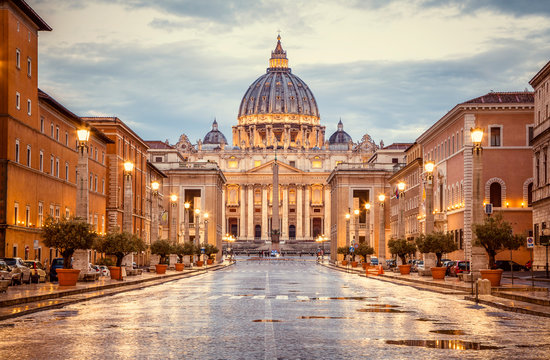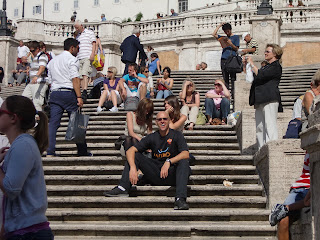That's Me In The Corner,Losing My Religion
⛪ Vatican City Learning Journey
Digital Spirituality: Where Ancient Faith Meets Modern Technology


Starting a Christian Rock Band
I'm thinking of starting a Christian rock band. I got the perfect name-Heretic. You guys know any base players?
🎭 The Irony of Faith
Standing atop Vatican City, the idea of calling a Christian rock band "Heretic" isn't blasphemy—it's honesty. The greatest spiritual leaders throughout history were often considered heretics by the establishment of their time. Sometimes challenging orthodoxy is the most faithful act of all.
🔄 Revolution and Revelation
From this rooftop perspective, you can see how the Vatican itself was built on revolutionary ideas—a fisherman named Peter, a tent-maker named Paul, a carpenter from Nazareth. Every reformation starts with someone willing to be called a heretic by those who prefer the status quo.

The Epicenter of Roman Catholicism
I spent this morning at the epicenter of Roman Catholicism, Saint Peter's Basilica. PPL were queuing up for Kodak moments. The only place where there were no lines were the confessionals.
📸 Kodak Moments vs. Sacred Silence
The contrast was striking: endless lines for photos, empty confessionals. In the digital age, we've become more interested in documenting our spiritual experiences than actually having them. The camera has become our new confessional booth—we tell our stories to social media instead of to ourselves or to God.

Religion is So Pre-September 11th
Religion is so pre September 11th. Of course, 20th century psychology has replaced sin with guilt.
🔄 The Great Replacement
The fusion of cyberspace and spirituality is a happy accident, a magical realm where all is possible. We've traded confessionals for comment sections, penance for posts, and communion for community—online community. The sacred hasn't disappeared; it's gone digital.
⚖️ Sin vs. Guilt: The Psychology Shift
Sin implies missing a divine mark; guilt implies disappointing human expectations. In the post-9/11 world, we've psychologized our spiritual struggles. Instead of seeking absolution, we seek therapy. Instead of priests, we trust algorithms to understand our souls.
The Pope of Software
First there was the Pope of Software, Bill Gates. "He" has created an electric gaia, or global brain, a collective unconscious that makes what is deeply personal universal—the uncensored, distributed self, and cyberspace.
🌐 The New Divine Network
Sartre said, "Hell is other people." Gates might as well say, "We are god...or at least made in his image." The Machine-God whispers through emails, networks, platforms—Facebook, YouTube, Twitter, the endless torrent of digital voices.
📱 The Connectivity Gospel
The Dalai Lama of Integration, Steve Jobs, created a celestial jukebox on tap—iTunes absolution for 99 cents. Songs that dispense blessings: "Cuz everyone is forgiven now. Cuz tonight's the night the world begins again." Digital communion through shared playlists and viral videos.
Putting the Sin Back into Sincere
Putting the sin back into sincere, I decided to step into the English speaking Confessional to receive 'penance.' At the very moment, the Monsignor came out and hung a sign saying closed. LOL.
⏰ Divine Timing or Cosmic Comedy?
There wouldn't be a second chance to make a first impression. The power of intention, however, was enough to provide salvation. As Woody Allen once told me in 1980 at Stromboli's Pizzeria in Greenwich Village, "Showing up is 99%."
🎭 The Comedy of Spiritual Timing
Sometimes the universe has a sense of humor. Maybe the closed confessional was itself a form of absolution—a reminder that intention matters more than ritual, that spiritual seeking doesn't require institutional validation.

Zencrafters Moment
It was a Zencrafters moment—Instant enlightenment in less than an hour. You see, nobody's perfect, and little me in that big church felt like a nobody.
🎯 Missing the Mark
You gotta be a somebody first before you can be a nobody—What is sin, after all? It's an old archery term. It means missing the mark. Cut to song "Who else is gonna bring you a Broken Arrow... We got mountains to climb."
🎨 Sacred Art and Ordinary Souls
Standing beneath Michelangelo's masterpiece, feeling simultaneously insignificant and infinite. The Sistine Chapel proves that the divine and the human aren't opposites—they're collaborators. God provides the inspiration; humans provide the hands that hold the brush.
💡 The Light is Dangerous
"Stay away from the light. The light is dangerous. Don't go near it. Don't even look at the light." Sometimes enlightenment isn't about seeking the light—it's about learning to live with the shadows it creates.